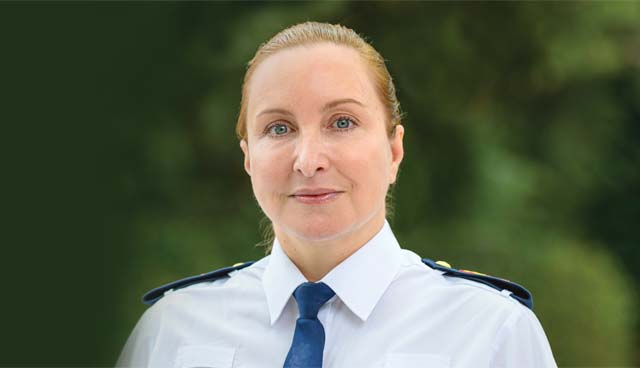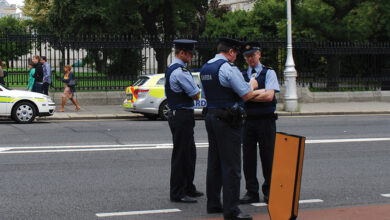Transforming policing services in Ireland

New Deputy Commissioner for Strategy, Governance and Performance in An Garda Síochána, Shawna Coxon, discusses planned transformation of the service amidst the challenges and opportunities of the Covid-19 pandemic.
Following the Commission on the Future of Policing’s recommendations to modernise An Garda Síochána, A Policing Service for the Future, the policing reform programme published in 2018, set out ambitions to respond to a changing society in the form of changing crime, changing communities, and a changing workforce.
The reform programme could not have predicted that societal change was about to be dramatically catalysed by the onset of a global pandemic, creating new challenges and opportunities for transformation within An Garda Síochána.
Deputy Commissioner Shawna Coxon is one of those hoping to capitalise on the many opportunities. The former Deputy Chief of Toronto Police joined An Garda Síochána in April 2021 and is now immersed in the delivery of a strategic vision for the force over the next three years.
Discussing An Garda Síochána’s strategy, Coxon outlines its five key pillars, of all of which have been informed by the Commission on the Future of Policing in Ireland review.
These are:
- community;
- tackling crime and preventative policing;
- victims and the vulnerable;
- protecting the security of the Irish State; and
- sustainable change and innovation.
The Deputy Commissioner explains that the pillars, described as ‘achievement aspirations’ by An Garda Síochána are supported by a range of ‘enablers’, ranging from information-led policing through to partnerships and engagement. These are areas of focus for the service’s internal business model.
“When discussing transformation, what I try to explain is that the need for transformation of policing is something that is happening around the world, not just here in Ireland. Global police services are still based on an old structural model. The physical jurisdiction model is a legal model which will not change but that does not mean that the operational model must stay the same. In some countries the operating model created in the 1950s is still in place,” she says.
“Compare that to the likes of healthcare where there are now tiered systems, where many services have a digital element, accelerated by Covid-19, and where services have adjusted to meet changing demand. This is the space we are moving in to. We want to leverage technology but also alter our broader operating model to give a better and more consistent service to more people right across the board.”
However, Coxon is cognisant that services cannot experience downtime while change is occurring: “While modernising we need to simultaneously protect our unique and successful relationship with the community,” she states.
A Policing Service for the Future
Having been launched in 2018, Coxon says that planned changes to An Garda Síochána’s operating model and core functions detailed in A Policing Service for the Future have continued to be progressed throughout the pandemic.
In October 2019, the operating model of An Garda Síochána shifted to cover four regions, with the total number of divisions reduced from 28 to 19. Coxon explains that while this shift might not necessarily be noticed by someone using the service, the centralisation of business functions has allowed for more a more consistent and effective service.
With this centralisation, the service has worked throughout the pandemic to strategically align and streamline the four functional areas of community engagement, crime, performance assurance and business services.
“When discussing transformation, what I try to explain is that the need for transformation of policing is something that is happening around the world, not just here in Ireland. Global police services are still based on an old structural model.”
Explaining some of the enablers for transformation, Coxon says that a new overarching ICT vision is about responding to public expectation and acknowledges that some existing technology systems within the police service do not have the capability to deliver on modern expectations.
However, the Deputy Commissioner is keen to stress that progress has already been made in relation to some key areas including the roll out of handheld devices to officers, the launch of cybercrime satellite hubs of the Garda National Cyber Crime Bureau (GNCCB) across various regions and in relation to cloud computing.
Identified by Coxon as the most important strategic leaver for transformation, she asserts that the people and culture enabler is key to ensuring that the organisation continuously strives to adapt to changing public expectations.

“While modernising we need to simultaneously protect our unique and successful relationship with the community.”
The Deputy Commissioner explains that work is ongoing to create a new operating model around workforce planning, whereby decisions about resources and where best to locate them are assessed.
At the same time, the service is moving towards a holistic one organisation vision, whereby each staff member, from sworn officers to civilian colleagues, is afforded opportunities for development. Furthermore, work is progressing on a new health and wellbeing strategy, with a particular focus on the mental health impact of Covid-19; a new equality, diversity, and inclusion strategy; and a new human rights and people development operating model.
Governance and accountability
Within the governance and accountability space, Coxon identifies the development of an Anti-Corruption Unit, new and soon-to-be-activated corporate governance structures, and a reviewed risk management framework as “gamechangers”. However, she acknowledges the challenge that comes with initiating change so quickly.
Addressing the existing challenges, including those which emerged during the pandemic, Coxon says: “As the Covid-19 crisis unfolded, An Garda Síochána adapted quickly and moved to deploy all available resources to provide reassurance to the public and ensure compliance with government public health guidance and regulations. Innovation took place under the areas of operational policing, organisational innovation and agility and the provision of training and learning.”
As an example, Coxon says that while recruitment to The Garda College was frozen for a considerable time during the pandemic, presenting a challenge to the future workforce, a pivot to online learning has heralded a significant training resource which will likely be retained and consolidated.
“Transformation requirements identified during the global pandemic really showcased what can be achieved and that positive and progressive initiatives can emerge from moments of adversity,” Coxon maintains.
“Looking to the future, we will seek to leverage that progress and embed a culture of innovation and change. Continuous innovation means that we establish principles but that we strive for continuous improvement and that everyone is encouraged to understand and embrace that.
“This is a time of exciting change. It is a time like no other but there is tremendous opportunity within it,” she concludes.
Profile: Shawna Coxon
Shawna Coxon is Deputy Commissioner Strategy, Governance and Performance at An Garda Síochána, a position she was appointed to in April 2021.
Coxon joined Toronto Police Service in 1996 and proudly served the communities of the City of Toronto as a police officer for 25 years. Her most recent roles were Deputy Chief, Priority Response Command (from 2017 to 2020); Deputy Chief, Communities and Neighbourhoods Command (2020), and Deputy Chief, Human Resources Command (from December 2020 to April 2021).
Prior to that she was Inspector, Transformation Task Force (from 2016 to 2017) where she was chosen by the Chief of Police for a committee of internal and community experts to modernise policing. This led to the strategy outlined in The Way Forward.
Deputy Commissioner Coxon has a PhD in Law (Criminal) from the University of Leicester.





